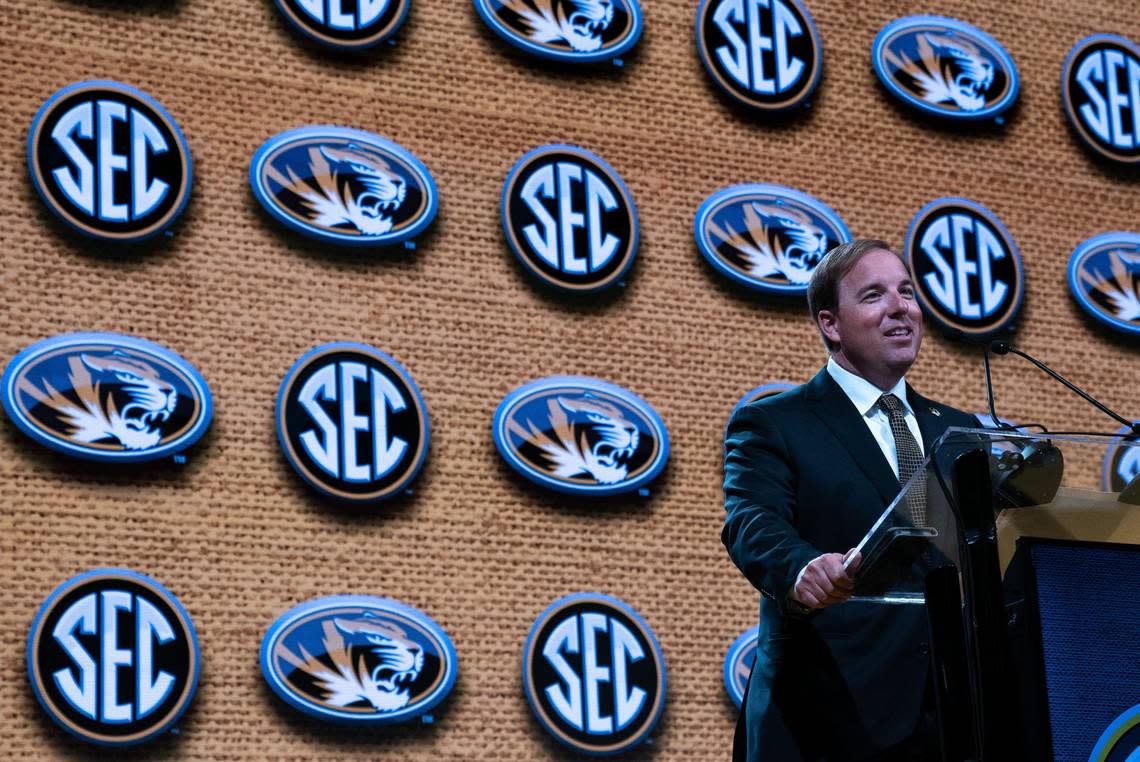Mizzou football coach blasts conference realignment after Big Ten, Big 12 raid Pac-12

Missouri football coach Eli Drinkwitz said he was hoping no one would ask him about conference realignment after the Pac-12 was raided by the Big 12 and Big Ten on Friday.
The question came anyway following the Tigers’ practice on Saturday.
Drinkwitz, after organizing his thoughts with a brief pause, let loose for close to three minutes, blasting the decision-makers behind the latest major movement in college sports and expressing his concern for the student-athletes who were affected.
“All right, I’m gonna say it. I thought the transfer window — I thought the portal was closed,” Drinkwitz quipped. “‘Oh, that’s just for the student athletes. The adults in the room get to do whatever they want, apparently.”
One of Drinkwitz’s main gripes with Arizona, Arizona State and Utah going to the Big 12 and Oregon and Washington bolting for the Big Ten is increasingly lengthy travel for players across all sports.
Student-athletes from those former Pac-12 schools could be headed as far east as Rutgers in the Big Ten and West Virginia and UCF in the Big 12 for competition. But that doesn’t seem to matter to revenue-minded officials pulling the strings of conference realignment, Drinkwitz said.
“My question is: Did we count the cost?” Drinkwitz asked. “I’m not talking about the financial cost. I’m talking about: Did we count the cost for the student-athletes involved in this decision? What cost is it to those student-athletes? We’re talking about a football decision, based on football, but what about softball and baseball, who have to travel across (the) country? Did we ask about the cost to them?
“Do we know what the number one indicator or symptom of or cause of mental health (problems) is? It’s lack of rest and sleep. Traveling in those baseball (and) softball games, those people, they travel commercial. They get done playing ... they gotta go to the airport. They come back, it’s 3 or 4 in the morning, they gotta go to class. I mean, did we ask any of them?”
Drinkwitz said he’s not worried about how conference realignment will affect the college football product, noting that “the game will be strong.” But he’s very concerned about the student-athletes involved and their lack of sway in the process.
Players are asked to support themselves with name, image and likeness (NIL) earnings but don’t get any of the television revenue the conferences and schools get from their respective sports. They also don’t have a seat at the table when realignment is discussed and decided.
“That’s the thing that’s bothering me right now in this whole situation, is we keep trying to limit what the student-athlete can do, but then we act on our own,” Drinkwitz said. “And everybody’s got their own reasons, and I’m not questioning those. I’m saying, as a collective group, have we asked ourselves what’s it going to cost the student-athletes?”
Drinkwitz also took notice of student-athletes’ opinions about the move. He alluded to softball players from Oregon and Arizona State showing their disappointment on social media.
Players pointed out concerns over travel, including that, in some cases, they picked schools close to home so their families could travel to games. They also expressed mental health concerns.
“Did we ask them if they wanted to travel from the East Coast to the West Coast?” Drinkwitz said. “Man, you know, I love the game. But every game that I coach, I look up in the stands and find my family. I make sure they can be there because that’s what I’m doing this for.”
Drinkwitz, whose Tigers moved to the SEC from the Big 12 in 2012, declined a follow-up question about how college football might be affected if indeed the current Power Five conferences are reshaped into three leagues in the future, as has been speculated.
He declined on the grounds that the question was hypothetical, whereas he had “real feelings” about the impact of the Big 12 and Big Ten’s latest moves.
Drinkwitz concluded with a grim outlook on the implications of the latest realignment for sports other than football.
“All those other sports, man, they’re not fortunate enough to travel like the way we do,” Drinkwitz said. “Football will be fine. ... (But) did we count the cost of the collateral damage of everybody else? I don’t know. Only time will tell, but that is my biggest (thought).
“Did we really think about that? ... I don’t think we did.”
